Waking Life (2001)
Dir. Richard Linklater
Writ. Richard Linklater
w/ Wiley Wiggins, Caveh Zahedi, Julie Delpy, Ethan Hawke, Steven Soderbergh, et al.
In a moment of pure self-actualization around the turn of the millenium, Waking Life entered the troposphere of social consciousness as naturally as though it had been hovering there always, with the implicit promise to stay just as long. Linklater brings us to a place, never more than a thought away from a young man full of questions, each answer bringing him a little more towards consciousness without guaranteeing him absolute reality. He begins with two children playing a fortune game. You remember the carefully folded paper with colors and numbers and, in the innermost folds, your secreted life's story? For this particular boy, "dream is destiny," and -- how true; for, of course, that boy is but a fragment of a larger dream that the main character, the questioner, finds himself waking up in, layer after layer, as his increased appreciation allows him to navigate his dreams more and more freely.
Recurring dream characters ebb and flow throughout the dreamscape, but the thread of questioning remains his constant divining tool, that hint of awareness that breathes of its own accord. One moment, our dreamer may be delving into postmodernism and, the next, into "the new evolution." Using simple voice-over, a classical ensemble, and a visual style that defies categorization (but how about "beautiful") Linklater accomplishes in a short time what many filmmakers can not in several expensive hours of reel: sort of stream-of-consciousness meets "what I wanted to talk about with my friends all my life, but..." By leaving characterization to the elements of argument and reason, the work becomes audience experience, allowing a rare peek into the writing process without muddying the cerebral quality of this fine work.
Yet, of all of Linklater's films, this one endures the most criticism. Ardent fans of other pieces supply the words "pretentious" and "glib" when avoiding eye contact and serious discussion. And while Dazed and Confused catchphrases have become household words, this little prize gets scuffed around and ignored. Could it be that audience resistance to the experience offered here waxes oxymoronic, that not allowing this artform to wrap and lull and awaken you somehow commits the highest pretentiousness of all? In a society obsessed with empty, mind-numbing entertainment, is it possible that we've forgotten that art's primary objective is to imitate life? Truth be told, this filmmaker takes it a step further.
Art interacts with life.
Oh, it's not the life of schedules where characters know the mundane details of each other's lives, like where they work or what kind of car they drive: none of that holds any import. But the body language of the characters conjures up such a sense of the spiritual, an inescapable and indefinable reality that gets portrayed best perhaps in a superb scene of a movie house showing the film Holy Moment. Caveh Zahedi shows that every moment in life, like in a movie, can be holy by staying open and committing to the moment, beginning with just two people. But then, of course, life kind of stops, gets put on pause. You stop talking. You feel. Like the experience of committing yourself to a theatre for a couple of hours or so, that's always time you'll never get back.
Which is why, when Linklater fills this with the aggregate of his experiential thought, what we get doesn't merely justify our participation in Waking Life; it challenges our approach to everything. Every minute detail that you thought was so important the last time you opened your mouth dimishes and your senses are lent to focus and imagination, which is precisely the difference between art, which is meant to supplement and to teach, and static, which is just more resistance. As Speed Levitch tells us, "We are the author of ourselves, co-authoring a gigantic Dostoevsky novel starring clowns." Life happens and sometimes, it is very, very funny. But it never really stops. A layer of perception always awaits us, right around the bend.
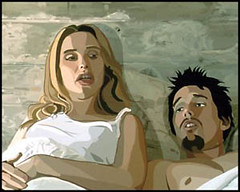

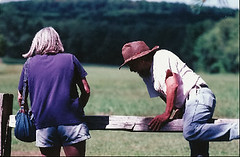
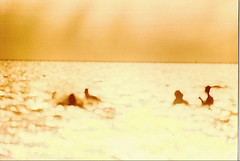
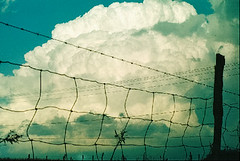
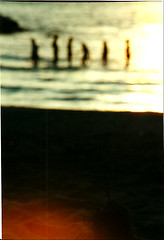
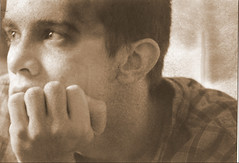

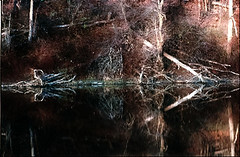






5 Comments:
i had only seen bits until last winter, after we talked about adding Linklater films
so inspiring. a bit addictive, tho'
all his stuff is strangely addictive.
nicely done
uhg... Caveh's bit has way too many 'like' and 'you know's in it... so annoying. I loved the movie, but I understand why people say it was pretentious. There were to many people on soap boxes... people who liked the smell of their own farts... trying to lure in open minded devotees. I think I enjoyed it because I was able to filter the esoteric bs from the useful stuff. Caveh did not make the cut.
Funny that you say that, Leigh, and I've heard several similar things over the years.
One of the things about Linklater, though, is that he lets people be themselves...even Ethan Hawke and Julie Delpy were asked to (encouraged to) put a lot of themselves into their characters in the Sunrise/Sunset movies. That's kind of one of his key identifiers...
The thing about Waking Life and people like Caveh is that by bringing their own hang-ups and pretentiousness to the film, the contrast between those early shots of the children on the porch and the grown-up versions of people who were all once that young is startling and real and easily taken for granted.
But when you think about it, the human experience is pretty damned pretentious. And often unpleasant.
If Caveh had a major esoteric agenda going on, I didn't notice because Linklater's commentary was like a guiding force.
Appreciate your blog ppost
Post a Comment
<< Home